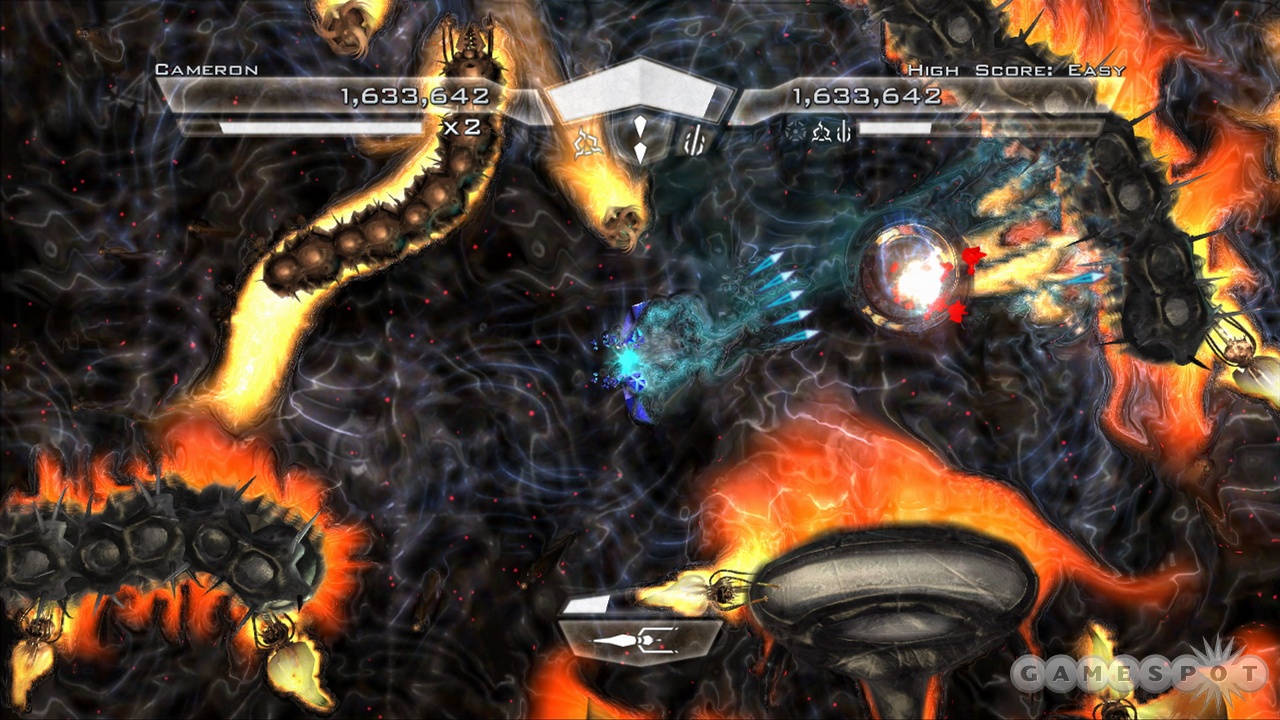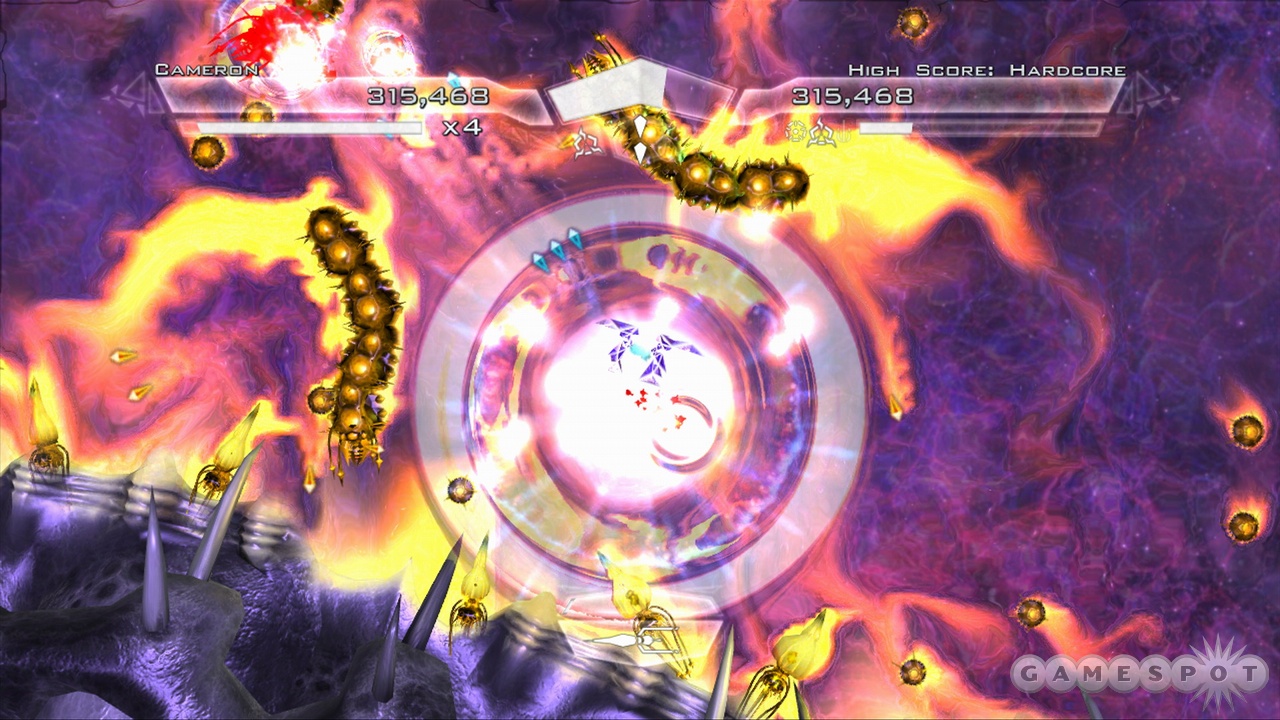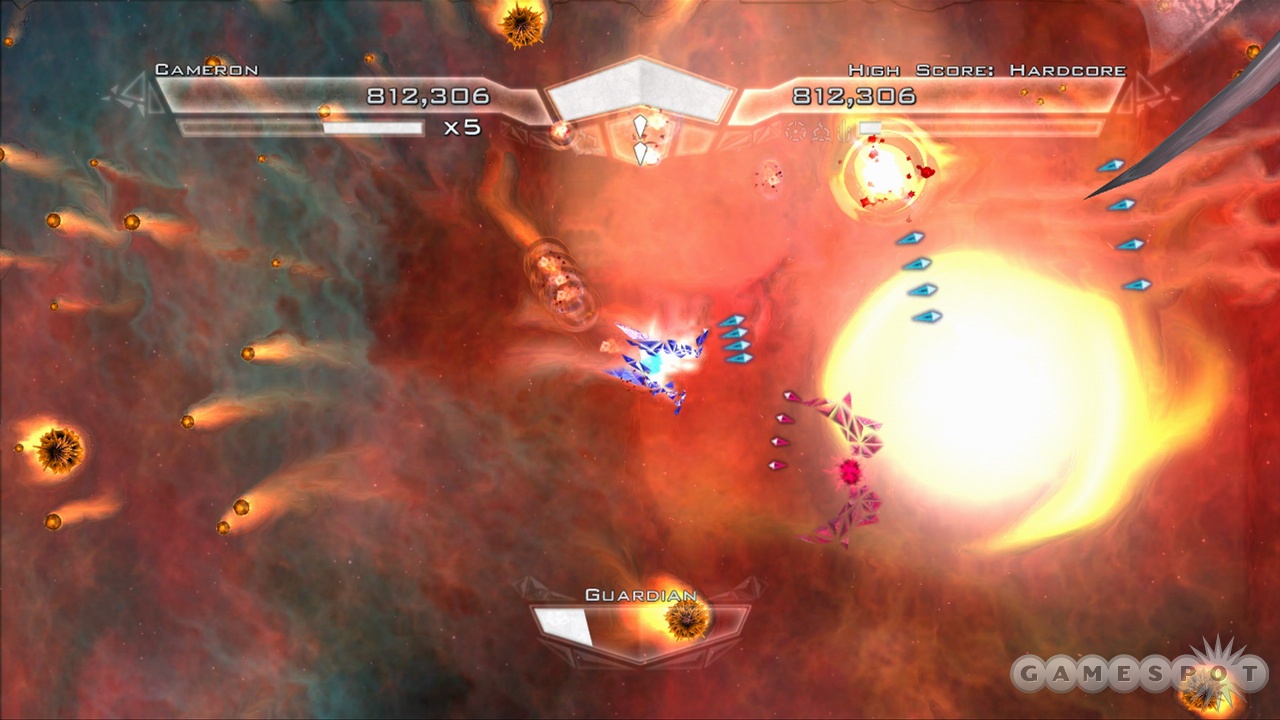Shoot-'em-ups have always been something of a showcase for otherworldly abstractions, from the asteroid-sized eyeballs of Gradius to the swarming angular attackers of Geometry Wars: Retro Evolved. PowerUp Forever's promise of a procedurally generated universe of ever-changing environments and ship configurations is certainly intriguing, and its simple core gameplay is enjoyable enough for a time, but the gene pool its surprisingly limited fleet of mutations draws from doesn't have the depth to deliver meaningful long-term replay value.
Your ship, a dense symmetrical arrangement of colored triangular shards, thrusts about a strange galaxy of alien life and features a simple and intuitive control scheme: move with the left analog stick and shoot a steady stream of crystals with the right. With this simple configuration, moment-to-moment play becomes a nearly instinctive exercise in dodging and damage-dealing, and even those who have never touched a shoot-'em-up should be able to pick up the basics almost immediately.

There are neither boundaries to limit exploration nor unique landmarks to encourage it, just an endless two-dimensional sprawl of obstacles and enemies for you to avoid and destroy. These high-definition heavens are unlike anything you'd see in our own night sky: Instead of an inky black canvas of sparkling white pin pricks, PowerUp Forever renders a striking layered field of bold and bright colors, vaguely creepy alien shapes, and psychedelic plasma effects. As you journey from one region to another, you'll never see the same mix of murky background patterns and trippy vapor trails twice, and there's no denying the hypnotic first impression that this randomized aesthetic approach and its subdued techno soundtrack create.
Amid the pyrotechnics, inhabitants relate to one another strictly on the basis of size, and even invaders like you aren't exempt from the hierarchy. The twists and tentacles of unidentifiable behemoths slumber as long as you're too small to present a threat, while puny organisms a 10th of your size scramble away to avoid getting squished. Between these extremes lie the immediate threats to your continued existence: slinking segmented caterpillar-like critters, seemingly sentient spiked asteroids, cosmic bullet-spraying manta rays, and waves of wriggling kamikaze. Blowing these suckers away earns you points and secondary weapon energy.
The trouble is, that's not far from a complete list of the monsters you'll encounter, and no amount of palette-shifting can inflate their numbers or obscure their surprising lack of distinctive behavior. Some enemies ignore you until you get too close, some stream in your general direction in an unending tide, and still others wander aimlessly while firing at nothing in particular, but that's as idiosyncratic as this small zoo ever gets. Indeed, the only enemies who actively dodge your attacks or behave with any measurable intelligence are the spinning critters who come out to orbit and harass you if you take too long to clear a level.

Though your survival depends largely on keeping assailants at bay, your larger goal is the destruction of a never-ending succession of hidden Guardians. These boss ships won't appear until you've enraged them by slaying the parasitic servants they dispatch to bleed energy from each level's sleeping giants. Unfortunately, a simple circle-strafing pattern is sufficient to destroy any of them, and it takes many levels of play to find one with enough firepower to offer much of a challenge on any but the hardest difficulty. Between the limited menagerie, the constant search for parasites, and the anticlimactic boss battles, every level is really the same search-and-destroy mission over and over again. The simple score multiplier system constantly threatens to tick back down to nothing and thus encourages you to tear through each region as fast as possible, but it's usually too easy to keep the meter going for this to inject much tension.
Worse, no matter how many Guardians you destroy, your arsenal never develops much diversity. As you complete levels, you'll earn the ability to fire more crystal shards with your default cannon, absorb and deflect incoming fire with a directional shield, unleash homing lasers on less nimble targets, and spit plasma charges that stun and deal splash damage. Sadly, all your special attacks draw from the same secondary weapon gauge, and none are as consistently effective as the screen-clearing smart bomb with which you start the game. Every now and then when upgrades take effect you'll find yourself stuck in a ship with its wings spread wide, or a brick with reduced horsepower, but such mutations are too rare to require much in the way of tactical change-ups.
Then there's the broken promise implicit in the game's title. The upgrade system is shallow enough, given that "improved" weapons don't deliver any additional fireworks to indicate their supposed increase in power, but the improvement process stops altogether once you reach the 16th level. From that point on, all you earn for clearing each stage is a temporary second tank of secondary weapon energy. PowerUp UntilStageSixteen might not have the same ring to it, but it certainly would have been a heck of a lot more accurate.

What could keep you playing in spite of all this, at least for a little while, is the way every victory over an ineffectual Guardian causes you to grow in relation to the rest of creation and thus elevates your position in the grand pecking order. It's definitely satisfying to pilot your way around a troublesome organic turret and then see it shrink to the size of a mere pest for the next stage, or to destroy a twirling astral tumbleweed that once seemed the size of a moon.
But even if you fall in love with the sensation that the universe is shrinking before your supposed might, you're bound to be saddened by the inexplicable lack of multiplayer support. All you get is a bare-bones leaderboard support and a quartet of unlockable (and forgettable) bonus modes. Guardian Rush measures how long you take to dispense with 10 easily vanquished boss ships; Survival reduces the whole affair to a timed game of Asteroids; and Defender dooms you to a cordoned-off arena where you dodge and repel bullets for a few minutes. Overkill is perhaps the most pointless of the bunch: with infinite smart bombs, setting a new high score is more a measure of your ill-spent free time than your skill.
PowerUp Forever is undoubtedly a cool experiment that might pave the way for a more well-rounded and full-featured example of procedurally generated content. However, the initial charm of its striking visuals and open-ended nature wears off fast enough that you'll be left grasping for something new before an afternoon has passed.